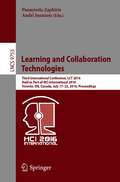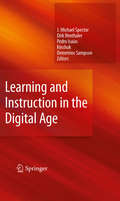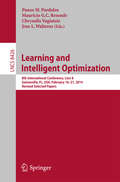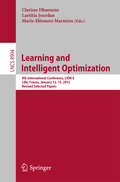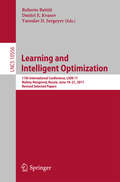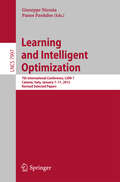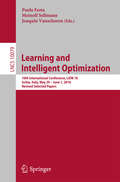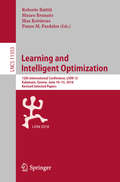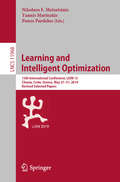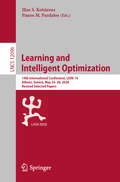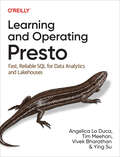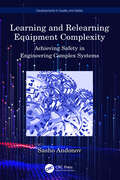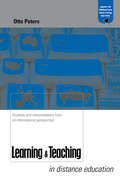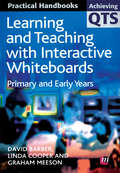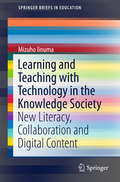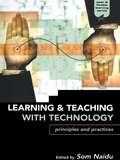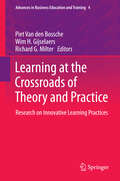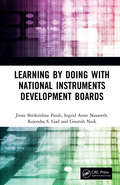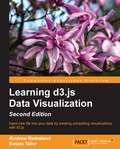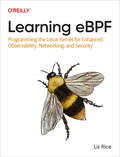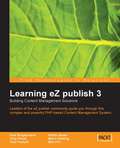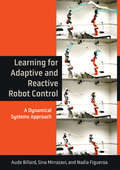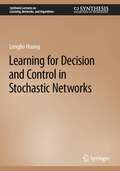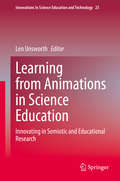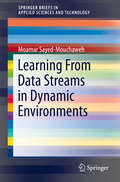- Table View
- List View
Learning and Collaboration Technologies: Third International Conference, LCT 2016, Held as Part of HCI International 2016, Toronto, ON, Canada, July 17-22, 2016, Proceedings (Lecture Notes in Computer Science #9753)
by Panayiotis Zaphiris Andri IoannouThis book constitutes the refereed proceedings of the Third International Conference on Learning and Collaboration Technologies, LCT 2016, held as part of the 18th International Conference on Human-Computer Interaction, HCII 2016, in Toronto, Canada, in July 2016, in conjunction with 14 thematically similar conferences. The 1287 papers presented at the HCII 2016 conferences were carefully reviewed and selected from 4354 submissions. The papers cover the entire field of human-computer interaction, addressing major advances in knowledge and effective use of computers in a variety of application areas. The papers included in this volume are organized in the following thematic sections: instructional design; interaction techniques and platforms for learning; learning performance; web-based, mobile and ubiquitous learning; intelligent learning environments; learning technologies; collaboration technologies; and cultural and social aspects of learning and collaboration technologies.
Learning and Instruction in the Digital Age
by J. Michael SpectorInstruction tailored to the individual student, learning and teaching outside the limits of time and space--ideas that were once considered science fiction are now educational reality, with the prospect of an intelligent Web 3.0 not far distant. Alongside these innovations exists an emerging set of critical-thinking challenges, as Internet users create content and learners (and teachers) take increased responsibility in their work. Learning and Instruction in the Digital Age nimbly balances the technological and pedagogical aspects of these rapid changes, gathering papers from noted researchers on a wealth of topics relating to cognitive approaches to learning and teaching, mental models, online learning, communications, and innovative educational technologies, among them: Cognition and student-centered, Web-based learning, The progression of mental models throughout a course of instruction, Experiencing education with 3D virtual worlds, Expanding educational boundaries through multi-school collaboration, Adapting e-learning to different learning styles, The student blog as reflective diary. With its blend of timely ideas and forward thinking, Learning and Instruction in the Digital Age will enrich the work of researchers in educational psychology, educational technology, and cognitive science.
Learning and Intelligent Optimization
by Panos M. Pardalos Chrysafis Vogiatzis Jose L. Walteros Mauricio G. C. ResendeThis book constitutes the thoroughly refereed post-conference proceedings of the 8th International Conference on Learning and Optimization, LION 8, which was held in Gainesville, FL, USA, in February 2014. The 33 contributions presented were carefully reviewed and selected for inclusion in this book. A large variety of topics are covered, such as algorithm configuration; multiobjective optimization; metaheuristics; graphs and networks; logistics and transportation; and biomedical applications.
Learning and Intelligent Optimization
by Laetitia Jourdan Clarisse Dhaenens Marie-Eléonore MarmionThis book constitutes the thoroughly refereed post-conference proceedings of the 9th International Conference on Learning and Optimization, LION 9, which was held in Lille, France, in January 2015. The 31 contributions presented were carefully reviewed and selected for inclusion in this book. The papers address all fields between machine learning, artificial intelligence, mathematical programming and algorithms for hard optimization problems. Special focus is given to algorithm selection and configuration, learning, fitness landscape, applications, dynamic optimization, multi-objective, max-clique problems, bayesian optimization and global optimization, data mining and - in a special session - also on dynamic optimization.
Learning and Intelligent Optimization
by Yaroslav D. Sergeyev Dmitri E. Kvasov Roberto BattitiLION 4, the 4th International Conference on Learning and Intelligent Op- mizatioN, was held during January 18-22 in Venice, Italy. This meeting, which continues the successful series of LION conferences, was aimed at exploring the intersectionsand uncharted territoriesbetween machine learning,arti?cial int- ligence, mathematical programming and algorithms for hard optimization pr- lems. The main purpose of the event was to bring together experts from these areas to discuss new ideas and methods, challenges and opportunities in various application areas, general trends and speci?c developments. Despite the economical crisis in 2009, which visibly a?ected the submission numbers of many conferences and workshops, we received an impressive n- ber of 87 submissions. As in previous years, we o?ered three di?erent paper categories for submission: (1) regular papers on original and unpublished work, (2)shortpapersonoriginalandunpublishedwork,and(3)worksfororalpres- tation only. Accepted papers from the ?rst two categories are published in the proceedings. Fromthe 87 submissions that wereceived,57 fell into the ?rstca- gory, 22 into the second one, and 8 into the last one. After a thorough reviewing process we accepted 19 regular papers (which amounts to an acceptance rate of 33%) and 11 short papers for publication in the proceedings. Additionally, nine regular paperswere accepted as shortpapers, and all eight submissions from the third category were accepted for presentation.
Learning and Intelligent Optimization
by Panos Pardalos Giuseppe NicosiaThis book constitutes the proceedings of the 7th International Conference on Learning and Optimization, LION 7, which was held in Catania, Italy, in January 2013. The 49 contributions presented in this volume were carefully reviewed and selected from 101 submissions. They explore the intersections and uncharted territories between machine learning, artificial intelligence, mathematical programming and algorithms for hard optimization problems.
Learning and Intelligent Optimization
by Paola Festa Meinolf Sellmann Joaquin VanschorenThis book constitutes the thoroughly refereed post-conference proceedings of the 10th International Conference on Learning and Optimization, LION 10, which was held on Ischia, Italy, in May/June 2016. The 14 full papers presented together with 9 short papers and 2 GENOPT papers were carefully reviewed and selected from 47 submissions. The papers address all fields between machine learning, artificial intelligence, mathematical programming and algorithms for hard optimization problems. Special focus is given to new ideas and methods; challenges and opportunities in various application areas; general trends, and specific developments.
Learning and Intelligent Optimization: 12th International Conference, LION 12, Kalamata, Greece, June 10–15, 2018, Revised Selected Papers (Lecture Notes in Computer Science #11353)
by Panos M. Pardalos Roberto Battiti Mauro Brunato Ilias KotsireasThis book constitutes the thoroughly refereed post-conference proceedings of the 12th International Conference on Learning and Intelligent Optimization, LION 12, held in Kalamata, Greece, in June 2018. The 28 full papers and 12 short papers presented have been carefully reviewed and selected from 62 submissions. The papers explore the advanced research developments in such interconnected fields as mathematical programming, global optimization, machine learning, and artificial intelligence. Special focus is given to advanced ideas, technologies, methods, and applications in optimization and machine learning.
Learning and Intelligent Optimization: 13th International Conference, LION 13, Chania, Crete, Greece, May 27–31, 2019, Revised Selected Papers (Lecture Notes in Computer Science #11968)
by Panos Pardalos Nikolaos F. Matsatsinis Yannis MarinakisThis book constitutes the thoroughly refereed pChania, Crete, Greece, in May 2019. The 38 full papers presented have been carefully reviewed and selected from 52 submissions. The papers focus on advancedresearch developments in such interconnected fields as mathematical programming, global optimization, machine learning, and artificial intelligence and describe advanced ideas, technologies, methods, and applications in optimization and machine learning.
Learning and Intelligent Optimization: 14th International Conference, LION 14, Athens, Greece, May 24–28, 2020, Revised Selected Papers (Lecture Notes in Computer Science #12096)
by Panos M. Pardalos Ilias S. KotsireasThis book constitutes the refereed post-conference proceedings on Learning and Intelligent Optimization, LION 14, held in Athens, Greece, in May 2020. The 37 full papers presented together with one invited paper have been carefully reviewed and selected from 75 submissions. LION deals with designing and engineering ways of "learning" about the performance of different techniques, and ways of using past experience about the algorithm behavior to improve performance in the future. Intelligent learning schemes for mining the knowledge obtained online or offline can improve the algorithm design process and simplify the applications of high-performance optimization methods. Combinations of different algorithms can further improve the robustness and performance of the individual components. Due to the COVID-19 pandemic, LION 14 was not held as a physical meeting.
Learning and Operating Presto: Fast, Reliable SQL for Data Analytics and Lakehouses
by Angelica Lo Duca Tim Meehan Vivek Bharathan Ying SuThe Presto community has mushroomed since its origins at Facebook in 2012. But ramping up this open source distributed SQL query engine can be challenging even for the most experienced engineers. With this practical book, data engineers and architects, platform engineers, cloud engineers, and software engineers will learn how to use Presto operations at your organization to derive insights on datasets wherever they reside. Authors Angelica Lo Duca, Tim Meehan, Vivek Bharathan, and Ying Su explain what Presto is, where it came from, and how it differs from other data warehousing solutions. You'll discover why Facebook, Uber, Alibaba Cloud, Hewlett Packard Enterprise, IBM, Intel, and many more use Presto and how you can quickly deploy Presto in production. With this book, you will: Learn how to install and configure PrestoUse Presto with business intelligence toolsUnderstand how to connect Presto to a variety of data sourcesExtend Presto for real-time business insightLearn how to apply best practices and tuningGet troubleshooting tips for logs, error messages, and moreExplore Presto's architectural concepts and usage patternsUnderstand Presto security and administration
Learning and Relearning Equipment Complexity: Achieving Safety in Engineering Complex Systems (Developments in Quality and Safety)
by Sasho AndonovWith industrial systems becoming ever more mechanized and reliant on advanced technology, the complexity of equipment, especially in risky industries, is increasing on a daily basis. A thorough understanding of operations and providing safety for these complex systems has become a firm requirement for many. This book offers the knowledge required by safety professionals to provide and maintain the safety of engineering complex systems. Through a scientific and engineering approach to designing, implementing, operating, and maintaining complex systems, Learning and Relearning Equipment Complexity: Achieving Safety in Engineering Complex Systems details the need for more engineering and scientific knowledge to understand and maintain their safety. It gives clear explanations of reasons for a system’s complexity, based on control systems and non-linear dynamics. In addition, the book addresses the necessary changes in the approach and the procedures for the safety assessment of engineering complex systems. The reader will develop a thorough understanding of what complex systems are, why they are complex, and how they are utilized. This book will appeal to any safety professional tasked with complex systems. This extends to professionals in risky industries such as aviation, nuclear power, chemicals, railway and transport, and pharmaceuticals.
Learning and Teaching in Distance Education: Analyses and Interpretations from an International Perspective (Open and Flexible Learning Series)
by Otto PetersThis unique and comprehensive overview of open and distance education is written by one of the best known names in the field. It integrates historical, contemporary and future aspects of distance education. Packed with international case studies, it goes beyond looking at the methods and technology of distance education, giving Otto Peters' renowned visions on the sociological and social impacts of distance education.Now published in paperback for the first time, this new edition includes a new section on virtual universities. A major contribution to thinking on open and distance education, this new edition will reach an even wider audience.
Learning and Teaching with Interactive Whiteboards: Primary and Early Years (Achieving QTS Practical Handbooks Series)
by David Barber Linda Cooper Mr Graham MeesonInteractive Whiteboards (IWBs) are becoming increasingly common in schools and early years settings, and it is important for trainees to be equipped with the necessary skills and understanding to use them effectively to enhance learning. This book takes a thematic approach, examining all the key issues required to get the most out of this versatile learning technology. All chapters contain case studies from a range of subject areas and across the key stages, ensuring the text is rooted in the reality of the primary classroom and its curriculum.
Learning and Teaching with Technology in the Knowledge Society
by Mizuho IinumaThis book discusses learning and teaching with modern technology in the new knowledge society. It focuses specifically on new literacy and technology in classroom environments. Based on a social-constructivist approach, this book covers a wide range of new technology use examples, such as participatory media, video recording systems and 3D computer graphics. A case study on a constructivist approach to teaching and learning, especially CSCL (computer supported collaborative learning), is discussed from a practical perspective for educators. It also includes specific in-class practices with detailed accounts of curricula featuring readily accessible yet new technology available for classroom use, such as Google Sketchup 3D computer models.
Learning and Teaching with Technology: Principles and Practices (Open and Flexible Learning Series)
by Som NaiduIncreased use of electronic libraries, multimedia courseware and computer-mediated communication is giving rise to an entirely new educational experience, prompting educators to assess the potential for improved and enriched learning and teaching models. This new book explores the creative opportunities offered by ICT, and provides an authoritative, rigorous survey of the ways in which ICT is currently transforming core teaching functions, including: *subject matter representation*activating learning and the engagement of students*supporting interaction and socialization*assessing learning outcomes*providing feedback to students. Written by leading experts in the field, this text draws on the experiences of practitioners at the forefront of ICT developments, making this essential reading for all educational professionals who recognize the new opportunities afforded by this changed environment. Suitable for those who are open and flexible learning specialists, educational technologists or educational developers in either a conventional or an e-learning environment.
Learning at the Crossroads of Theory and Practice
by Wim H. Gijselaers Piet Van den Bossche Richard G. MilterCore concepts in education are changing. For example, professional performance or expertise is not uniquely the fruit of specialist knowledge acquired at professional schools, but the sum of influences exerted by a complex web of continuous learning opportunities for which an individual is well (or ill) prepared by their schools and their workplace. The key contributory factors to professional expertise are how professional schools connect to professional practice, how schools prepare graduates for continuous learning, and how the workplace endorses continuous development. Thus, the question this volume addresses--how to design learning and working environments that facilitate the integration of these three elements--is at the heart of contemporary pedagogical theory. The authors also ask a second vital question: how do we educate learners that go on to maximize their life's learning opportunities by regulating their own ongoing learning? Learning at the Crossroads of Theory and Practice argues that with the theory of learning at a crossroads, this is an unprecedented opportunity for learning about learning. The book sheds light on different elements of this challenge: integrating theory and practice in business education, generating and fully exploiting workplace learning opportunities, and enriching our classrooms by coupling theoretical knowledge with the richness of real-life experience.
Learning by Doing with National Instruments Development Boards
by Rajendra S. Gad Jivan Shrikrishna Parab Ingrid Anne Nazareth Gourish NaikLearning by Doing with National Instruments Development Boards starts with a brief introduction to LabVIEW programming, which is required to explore the National Instrument platform, an introduction that includes detailed installation and licensing setup. Further, it gives the features and configuration setup of NI SPEEDY-33, NI ELVIS and myRIO boards. The focus of the book is on worked-out case studies for students working in different areas of electronics such as basic digital design, biomedical instrumentation, sensors and measurement. Data acquisition using SPEEDY-33, NI –ELVIS and myRIO kits is also odiscussed. The book also examines the myRIO platform.
Learning d3.js Data Visualization - Second Edition
by Swizec Teller Ændrew RininslandInject new life into your data by creating compelling visualizations with d3.js About This Book * Understand how to best represent your data by developing the right kind of visualization * Harness the power of D3 by building interactive and real-time data-driven web visualizations * This book will provide a strong foundation in designing compelling web visualizations with D3.js Who This Book Is For This book is for web developers, data scientists, and anyone interested in representing data through interactive visualizations on the web with D3. Some basic JavaScript knowledge is expected, but no prior experience with data visualization or D3 is required to follow this book. What You Will Learn * Gain a solid understanding of the common D3 development idioms * Be able to input data, transform it, and output it as a visualization * Add simple effects and user interactions to a visualization * Find out how to write basic D3 code for server using Node.js * Automate testing visualizations using Mocha * Achieve fluency in ES2015, the most modern version of JavaScript In Detail D3 has emerged as one of the leading platforms to develop beautiful, interactive visualizations over the web. We begin by setting up a strong foundation, then build on this foundation book will take you through the entire world of reimagining data using interactive, animated visualizations created in D3.js. In addition to covering the various features of D3.js to build a wide range of visualizations, we also focus on the entire process of representing data through visualizations so that developers and those interested in data visualization will get the entire process right. We also include chapters that explore a wide range of visualizations through practical use cases. By the end of this book, you will have unlocked the mystery behind successful data visualizations and will be ready to use D3 to transform any data into a more engaging and sophisticated visualization. Style and approach This book has comprehensive explanation on how to leverage the power of D3.js to create powerful and creative visualizations through step by step instruction
Learning eBPF: Programming the Linux Kernel for Enhanced Observability, Networking, and Security
by Liz RiceWhat is eBPF? With this revolutionary technology, you can write custom code that dynamically changes the way the kernel behaves. It's an extraordinary platform for building a whole new generation of security, observability, and networking tools.This practical book is ideal for developers, system administrators, operators, and students who are curious about eBPF and want to know how it works. Author Liz Rice, chief open source officer with cloud native networking and security specialists Isovalent, also provides a foundation for those who want to explore writing eBPF programs themselves.With this book, you will:Learn why eBPF has become so important in the past couple of yearsWrite basic eBPF code, and manipulate eBPF programs and attach them to eventsExplore how eBPF components interact with Linux to dynamically change the operating system's behaviorLearn how tools based on eBPF can instrument applications without changes to the apps or their configurationDiscover how this technology enables new tools for observability, security, and networking
Learning eZ publish 3: Building content management solutions
by Ben PirtAlthough there is good quality reference documentation on eZ publish, there are currently no books available. Therefore, this book has been written from the ground up, in a tutorial/case study style to fill this gap. This book is for Web developers new to eZ publish, while experienced developers of eZ publish who want to consolidate their knowledge will learn new techniques from eZ publish masters. It has also been designed for those new to eZ publish while also being aimed at experienced developers who want to consolidate their knowledge and learn new tricks from eZ publish masters
Learning for Adaptive and Reactive Robot Control: A Dynamical Systems Approach (Intelligent Robotics and Autonomous Agents series)
by Aude Billard Sina Mirrazavi Nadia FigueroaMethods by which robots can learn control laws that enable real-time reactivity using dynamical systems; with applications and exercises.This book presents a wealth of machine learning techniques to make the control of robots more flexible and safe when interacting with humans. It introduces a set of control laws that enable reactivity using dynamical systems, a widely used method for solving motion-planning problems in robotics. These control approaches can replan in milliseconds to adapt to new environmental constraints and offer safe and compliant control of forces in contact. The techniques offer theoretical advantages, including convergence to a goal, non-penetration of obstacles, and passivity. The coverage of learning begins with low-level control parameters and progresses to higher-level competencies composed of combinations of skills. Learning for Adaptive and Reactive Robot Control is designed for graduate-level courses in robotics, with chapters that proceed from fundamentals to more advanced content. Techniques covered include learning from demonstration, optimization, and reinforcement learning, and using dynamical systems in learning control laws, trajectory planning, and methods for compliant and force control . Features for teaching in each chapter: • applications, which range from arm manipulators to whole-body control of humanoid robots; • pencil-and-paper and programming exercises; • lecture videos, slides, and MATLAB code examples available on the author&’s website . • an eTextbook platform website offering protected material[EPS2] for instructors including solutions.
Learning for Decision and Control in Stochastic Networks (Synthesis Lectures on Learning, Networks, and Algorithms)
by Longbo HuangThis book introduces the Learning-Augmented Network Optimization (LANO) paradigm, which interconnects network optimization with the emerging AI theory and algorithms and has been receiving a growing attention in network research. The authors present the topic based on a general stochastic network optimization model, and review several important theoretical tools that are widely adopted in network research, including convex optimization, the drift method, and mean-field analysis. The book then covers several popular learning-based methods, i.e., learning-augmented drift, multi-armed bandit and reinforcement learning, along with applications in networks where the techniques have been successfully applied. The authors also provide a discussion on potential future directions and challenges.
Learning from Animations in Science Education: Innovating in Semiotic and Educational Research (Innovations in Science Education and Technology #25)
by Len UnsworthThis book examines educational semiotics and the representation of knowledge in school science. It discusses the strategic integration of animation in science education. It explores how learning through the creation of science animations takes place, as well as how animation can be used in assessing student’s science learning. Science education animations are ubiquitous in a variety of different online sites, including perhaps the most popularly accessed YouTube site, and are also routinely included as digital augmentations to science textbooks. They are popular with students and teachers and are a prominent feature of contemporary science teaching. The proliferation of various kinds of science animations and the ready accessibility of sophisticated resources for creating them have emphasized the importance of research into various areas: the nature of the semiotic construction of knowledge in the animation design, the development of critical interpretation of available animations, the strategic selection and use of animations to optimize student learning, student creation of science animations, and using animation in assessing student science learning. This book brings together new developments in these research agendas to further multidisciplinary perspectives on research to enhance the design and pedagogic use of animation in school science education. Chapter 1 is available open access under a Creative Commons Attribution 4.0 International License via link.springer.com.
Learning from Data Streams in Dynamic Environments
by Moamar Sayed-MouchawehThis book addresses the problems of modeling, prediction, classification, data understanding and processing in non-stationary and unpredictable environments. It presents major and well-known methods and approaches for the design of systems able to learn and to fully adapt its structure and to adjust its parameters according to the changes in their environments. Also presents the problem of learning in non-stationary environments, its interests, its applications and challenges and studies the complementarities and the links between the different methods and techniques of learning in evolving and non-stationary environments.
